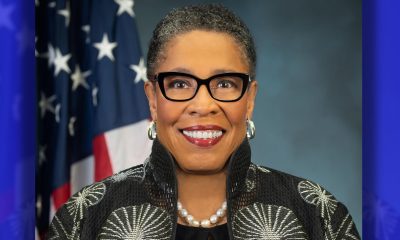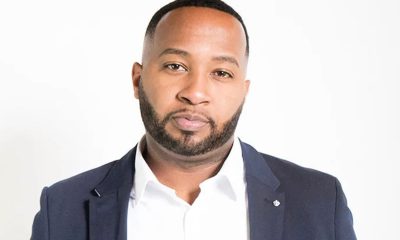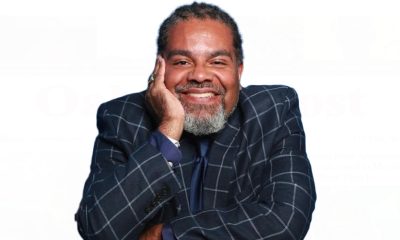#NNPA BlackPress
New Parents and a Newborn with Sickle Cell Disease: What Now?
NNPA NEWSWIRE — In this article, I’d like to introduce you to TaLana Hughes, a mother of three who is also the executive director of the Sickle Cell Disease Association of Illinois (SCDAI). TaLana has one child with Sickle Cell Disease and two children with the sickle cell trait.
Ask Dr. Kevin
By Dr. Kevin Williams , Chief Medical Officer for Rare Disease at Pfizer
The “Ask Dr. Kevin” series is brought to you by Pfizer Rare Disease in collaboration with the National Newspaper Publishers Association (NNPA) to increase understanding of sickle cell disease.
Dr. Kevin Williams is the Chief Medical Officer for Rare Disease at Pfizer where he leads a Medical Affairs organization of approximately 150 medical colleagues around the globe. He pursued medicine after being inspired by his father’s work as a general practitioner in his hometown of Baton Rouge, Louisiana. Dr. Kevin is passionate about raising awareness and increasing understanding of rare diseases, such as sickle cell disease, in the African American community.

For the last two years, I’ve been honored to talk with you about sickle cell disease (SCD) through this column, sharing important information and my perspectives as a medical professional. Now, as the “Ask Dr. Kevin” series enters its third year, I wanted to change things a bit by letting you also hear directly from those who matter most—people living with SCD and their caregivers.
In this article, I’d like to introduce you to TaLana Hughes, a mother of three who is also the executive director of the Sickle Cell Disease Association of Illinois (SCDAI). TaLana has one child with SCD and two children with the sickle cell trait.
As TaLana knows from both personal experience and through her work with SCDAI, learning that your child has SCD can feel overwhelming and scary. While family and friends can be an important source of support, they may not always know the best way to help—and parents may find it hard to explain what they need.
In order to help people better understand what it’s like to be a parent of a newborn with SCD, and how family and friends can be most helpful, TaLana and I share our thoughts below on some of the most common questions we’ve been asked about the topic.
What are the biggest fears and challenges parents face upon learning their child has SCD?
TaLana: Immediately after my child received the diagnosis, my husband and I experienced an initial wave of shock and fear. It became suddenly apparent that both of us have the sickle cell trait which we passed down to our child. After the initial shock wore off, a million questions started to run through our minds, and we wondered what this would ultimately mean for our daughter.
Dr. Kevin: I know that for many parents, an SCD diagnosis can certainly be overwhelming, and I see how parents may fear the worst. However, it’s important to know that in recent years we’ve seen advances in understanding and scientific breakthroughs that are potentially paving the way for better care of people with SCD.
I also can’t stress enough to new parents the importance of setting up a healthcare team for their child as soon as possible. Receiving care early and often can help reduce the impacts and complications of the disease. SCD takes a toll on all systems of the body, so having a team made up of a pediatric hematologist, primary care doctor, and other specialists, such as an eye doctor, pulmonologist, cardiologist, and dentist, is key to the health of the child.
What are some tips for helping parents cope with the news?
TaLana: I know that I needed time to digest the news to really understand how the diagnosis would impact our child and family. Once I had a stronger understanding of the disease and how it would manifest over time as my child grew, I started to have a better idea of the support needed from my family and our local community.
Dr. Kevin: I’ve seen incredible connections and support systems form when parents of a child with SCD talk with other parents going through the same thing. There’s a certain comfort that comes from talking to those who have “been there, done that.” Parents can meet other families through local community groups, online platforms like oneSCDvoice*, which includes curated content and a wealth of information for those in the SCD community, and the Sickle Cell Disease Association of America (SCDAA), which publishes a calendar of local SCD events around the country.
How can family and friends offer support?
TaLana: I tell parents of children with SCD to educate their loved ones about the disease and to communicate how it affects your child. Teaching others about the condition gives me the opportunity to explain what kind of specific support I need. It also allows my family and friends to figure out how to best provide support—whether it be a ride to an appointment, a change of clothes for an overnight stay in the hospital, or help with small chores at home.
Dr. Kevin: I also encourage family members and friends to learn as much as they can on their own, because there are still a number of misperceptions about the disease. For example, the belief that a baby born with SCD will die before reaching adulthood. As I mentioned in a previous article, this is a myth! The majority of children with SCD live to adulthood, thanks to advances in SCD care. However, the life expectancy of someone with SCD in the US is only between 40 and 60 years, compared to average US life expectancy of 78.8 years. By understanding the truths about SCD, family and friends are in a better position to provide meaningful support and be allies.
What tools are most helpful for new parents caring for their child with SCD?
TaLana: I always carry a notebook with me so I can take notes and keep track of my child’s “baseline” and SCD history to see how the disease manifests over time. I have an overnight bag in my trunk that includes a change of clothes and snacks. I carry a thermometer in my purse to take my child’s temperature and an incentive spirometer to help facilitate stronger breathing. I’ve also joined a group chat with other parents who have children with SCD, and this has been one of my most important tools for connecting with and learning from other parents who share this experience.
Dr. Kevin: These are great suggestions. I would also encourage parents to connect with their local SCD organization, like an SCDAA local chapter. With a disease like SCD, which is rare in the US and often misunderstood, connecting with others who have similar experiences and challenges is so important for building your support system.
Do infants experience pain crises? What are the warning signs? What is your best advice for new parents when it comes to handling a newborn having a crisis?
TaLana: Yes, infants can have pain crises. However, because they can’t communicate with words and explain any pain they are experiencing, recognizing pain crises can be difficult. In my own experience, the first warning signs are usually dactylitis, where the hands and feet begin to swell, and a fever. However, because new parents usually pay attention to anything out of the ordinary seen in their newborn, they often are able to notice how their own child displays warning signs.
When it comes to noticing something out of the ordinary in my child, I always play it safe. I also find it really beneficial to speak with other parents with children who have SCD and to learn about what they see in their own children and discuss how they’ve handled episodes of pain.
Dr. Kevin: It’s also important for parents to understand that pain crises are unfortunately a universal experience for people with SCD. Crises typically manifest in infants aged six months and older, and they are often unpredictable and can occur up to several times a year. So, to TaLana’s point, learning to recognize what a pain crisis looks like in their child will help parents know when to seek help.
What do babysitters or other caregivers need to know?
TaLana: I make sure other caregivers and babysitters know about my child’s personal regimens and what to do in case of an emergency. I share important pointers, like to make sure my child is hydrated and never around smoke, which can increase the risk of Acute Chest Syndrome (ACS), a bout of pneumonia or a serious lung condition due to the sickling of red blood cells, in people with SCD.
Lastly, I make sure they know how special my child is and all the wonderful qualities she has. I tell them her likes and dislikes, hobbies and interests, and what makes her laugh. Having SCD may be a normal part of my child’s life, but I make sure she is not defined by her condition.
Dr. Kevin: I agree wholeheartedly. Children with SCD are children first and foremost. While the disease affects them, it certainly does not define them—nor should SCD or any disease define the person who has it.
For more information about parenting a child with SCD, check out “A Parents Handbook for Sickle Cell Disease” and the CDC’s “5 Facts You Should Know about SCD.”
Keep up to date on Pfizer’s SCD efforts by visiting our page here. You can also follow Pfizer on Facebook and Twitter.
*Supported by Pfizer
About Dr. Kevin Williams
Dr. Kevin Williams is the Chief Medical Officer (CMO) for Pfizer Rare Disease. In this role, he leads a Medical Affairs organization of approximately 150 medical colleagues around the globe supporting Pfizer’s efforts and portfolio in Rare Disease. Dr. Kevin joined Pfizer in January 2004 as a Director of Regional Medical & Research Specialist working in the HIV disease area. After moving into a Team Leader position in July 2005, he served in various leadership roles during his career at Pfizer. Dr. Kevin moved into his current Rare Disease CMO position in May 2016.
Dr. Kevin received his medical degree from the UCLA School of Medicine and is board certified in Internal Medicine. Following a 2-year fellowship in Health Services Research at UCLA and a brief academic career as an Instructor of Medicine at the UCLA School of Medicine, he spent 8 years in private practice caring for HIV-positive patients while maintaining an academic appointment at the UCLA School of Medicine as an Assistant Clinical Professor of Medicine. In addition to his medical degree, Dr. Kevin has a Master’s in Public Health from the UCLA School of Public Health and a Juris Doctorate from Harvard Law School.
#NNPA BlackPress
IN MEMORIAM: Ramona Edelin, Influential Activist and Education Advocate, Dies at 78
NNPA NEWSWIRE — Born on September 4, 1945, in Los Angeles, California, activist Ramona Edelin’s early years were marked by a commitment to education and social justice. According to her HistoryMakers biography, after graduating from Fisk University with a Bachelor’s degree in 1967, she pursued further studies at the University of East Anglia in England. She earned her master’s degree before completing her Ph.D. at Boston University in 1981.
The post IN MEMORIAM: Ramona Edelin, Influential Activist and Education Advocate, Dies at 78 first appeared on BlackPressUSA.

By Stacy M. Brown, NNPA Newswire Senior National Correspondent
@StacyBrownMedia
Once upon a time, Black Americans were simply known as colored people, or Negroes. That is until Ramona Edelin came along. The activist, renowned for her pivotal roles in advancing civil rights, education reform, and community empowerment, died at her D.C. residence last month at the age of 78. Her death, finally confirmed this week by Barnaby Towns, a communications strategist who collaborated with Dr. Edelin, was attributed to cancer.
Born on September 4, 1945, in Los Angeles, California, Edelin’s early years were marked by a commitment to education and social justice. According to her HistoryMakers biography, after graduating from Fisk University with a Bachelor’s degree in 1967, she pursued further studies at the University of East Anglia in England. She earned her master’s degree before completing her Ph.D. at Boston University in 1981.
Edelin’s contributions to academia and activism were manifold. She was pivotal in popularizing the term “African American” alongside Rev. Jesse L. Jackson in the late 1980s.
Jackson had announced the preference for “African American,” speaking for summit organizers that included Dr. Edelin. “Just as we were called Colored, but were not that, and then Negro, but not that, to be called Black is just as baseless,” he said, adding that “African American” “has cultural integrity” and “puts us in our proper historical context.”
Later, Edelin told Ebony magazine, “Calling ourselves African Americans is the first step in the cultural offensive,” while linking the name change to a “cultural renaissance” in which Black Americans reconnected with their history and heritage.
“Who are we if we don’t acknowledge our motherland?” she asked later. “When a child in a ghetto calls himself African American, immediately he’s international. You’ve taken him from the ghetto and put him on the globe.”
The HistoryMakers bio noted that Edelin’s academic pursuits led her to found and chair the Department of African American Studies at Northeastern University, where she established herself as a leading voice.
Transitioning from academia to advocacy, Edelin joined the National Urban Coalition in 1977, eventually ascending to president and CEO. During her tenure, she spearheaded initiatives such as the “Say Yes to a Youngster’s Future” program, which provided crucial support in math, science, and technology to youth and teachers of color in urban areas. Her biography noted that Edelin’s efforts extended nationwide through partnerships with organizations like the National Science Foundation and the United States Department of Education.
President Bill Clinton recognized Edelin’s expertise by appointing her to the Presidential Board on Historically Black Colleges and Universities in 1998. She also co-founded and served as treasurer of the Black Leadership Forum, solidifying her standing as a respected leader in African American communities.
Beyond her professional achievements, Edelin dedicated herself to numerous boards and committees, including chairing the District of Columbia Educational Goals 2000 Panel and contributing to the Federal Advisory Committee for the Black Community Crusade for Children.
Throughout her life, Edelin received widespread recognition for her contributions. Ebony magazine honored her as one of the 100 Most Influential Black Americans, and she received prestigious awards such as the Southern Christian Leadership Award for Progressive Leadership and the IBM Community Executive Program Award.
The post IN MEMORIAM: Ramona Edelin, Influential Activist and Education Advocate, Dies at 78 first appeared on BlackPressUSA.
#NNPA BlackPress
Tennessee State University Board Disbanded by MAGA Loyalists as Assault on DE&I Continues
NNPA NEWSWIRE — Recent legislative actions in Tennessee, such as repealing police reform measures enacted after the killing of Tyre Nichols, underscore a troubling trend of undermining local control and perpetuating racist agendas. The new law preventing local governments from restricting police officers’ authority disregards community efforts to address systemic issues of police violence and racial profiling.
The post Tennessee State University Board Disbanded by MAGA Loyalists as Assault on DE&I Continues first appeared on BlackPressUSA.

By Stacy M. Brown, NNPA Newswire Senior National Correspondent
@StacyBrownMedia
Tennessee State University (TSU), the state’s only public historically Black college and university (HBCU), faces a tumultuous future as Gov. Bill Lee dissolved its board, a move supported by racist conservatives and MAGA Republicans in the Tennessee General Assembly, who follow the lead of the twice-impeached, four-times indicted, alleged sexual predator former President Donald Trump. Educators and others have denounced the move as an attack on diversity, equity, and inclusion (DE&I) and a grave setback for higher education.
Critics argue that TSU’s purported financial mismanagement is a manufactured crisis rooted in decades of underinvestment by the state government. They’ve noted that it continues a trend by conservatives and the racist MAGA movement to eliminate opportunities for Blacks in education, corporate America, and the public sector.
Gevin Reynolds, a former speechwriter for Vice President Kamala Harris, emphasizes in an op-ed that TSU’s financial difficulties are not the result of university leadership because a recent audit found no evidence of fraud or malfeasance.
Reynolds noted that the disbanding of TSU’s board is not an isolated incident but part of a broader assault on DE&I initiatives nationwide. Ten states, including Tennessee, have enacted laws banning DE&I policies on college campuses, while governors appointing MAGA loyalists to university trustee positions further undermine efforts to promote inclusivity and equality.
Moreover, recent legislative actions in Tennessee, such as repealing police reform measures enacted after the killing of Tyre Nichols, underscore a troubling trend of undermining local control and perpetuating racist agendas. The new law preventing local governments from restricting police officers’ authority disregards community efforts to address systemic issues of police violence and racial profiling.
The actions echo historical efforts to suppress Black progress, reminiscent of the violent backlash against gains made during the Reconstruction era. President Joe Biden warned during an appearance in New York last month that Trump desires to bring the nation back to the 18th and 19th centuries – in other words, to see, among other things, African Americans back in the chains of slavery, women subservient to men without any say over their bodies, and all voting rights restricted to white men.
The parallels are stark, with white supremacist ideologies used to justify attacks on Black institutions and disenfranchise marginalized communities, Reynolds argued.
In response to these challenges, advocates stress the urgency of collective action to defend democracy and combat systemic racism. Understanding that attacks on institutions like TSU are symptomatic of broader threats to democratic norms, they call for increased civic engagement and voting at all levels of government.
The actions of people dedicated to upholding the principles of inclusivity, equity, and justice for all will determine the outcome of the ongoing fight for democracy, Reynolds noted. “We are in a war for our democracy, one whose outcome will be determined by every line on every ballot at every precinct,” he stated.
The post Tennessee State University Board Disbanded by MAGA Loyalists as Assault on DE&I Continues first appeared on BlackPressUSA.
#NNPA BlackPress
Braxton Haulcy and the Expansion of Walker|West Music Academy
May 24, 2023 – Walker West Music Academy gets an early start on expansion. Join us for a Wednesday episode of The …
The post Braxton Haulcy and the Expansion of Walker|West Music Academy first appeared on BlackPressUSA.

May 24, 2023 – Walker West Music Academy gets an early start on expansion. Join us for a Wednesday episode of The …
The post Braxton Haulcy and the Expansion of Walker|West Music Academy first appeared on BlackPressUSA.
-

 Activism4 weeks ago
Activism4 weeks agoOakland Post: Week of March 27 – April 2, 2024
-

 #NNPA BlackPress4 weeks ago
#NNPA BlackPress4 weeks agoBeloved Actor and Activist Louis Cameron Gossett Jr. Dies at 87
-

 Community1 week ago
Community1 week agoFinancial Assistance Bill for Descendants of Enslaved Persons to Help Them Purchase, Own, or Maintain a Home
-

 Activism3 weeks ago
Activism3 weeks agoOakland Post: Week of April 3 – 6, 2024
-

 Business1 week ago
Business1 week agoV.P. Kamala Harris: Americans With Criminal Records Will Soon Be Eligible for SBA Loans
-

 Activism2 weeks ago
Activism2 weeks agoOakland Post: Week of April 10 – 16, 2024
-

 Community1 week ago
Community1 week agoAG Bonta Says Oakland School Leaders Should Comply with State Laws to Avoid ‘Disparate Harm’ When Closing or Merging Schools
-

 Community6 days ago
Community6 days agoOakland WNBA Player to be Inducted Into Hall of Fame



























































4 Comments